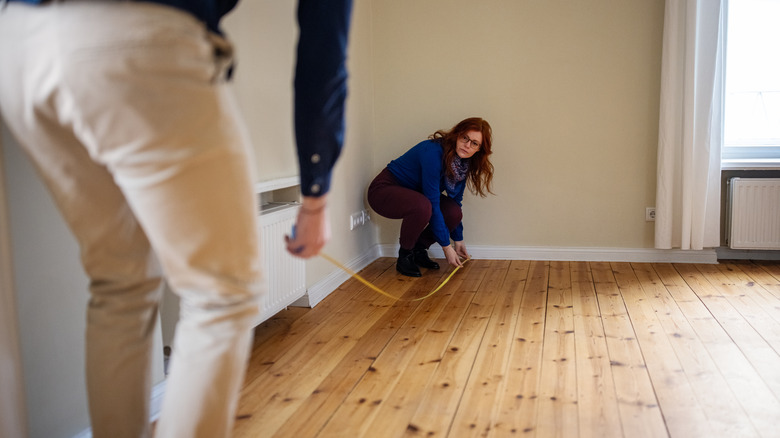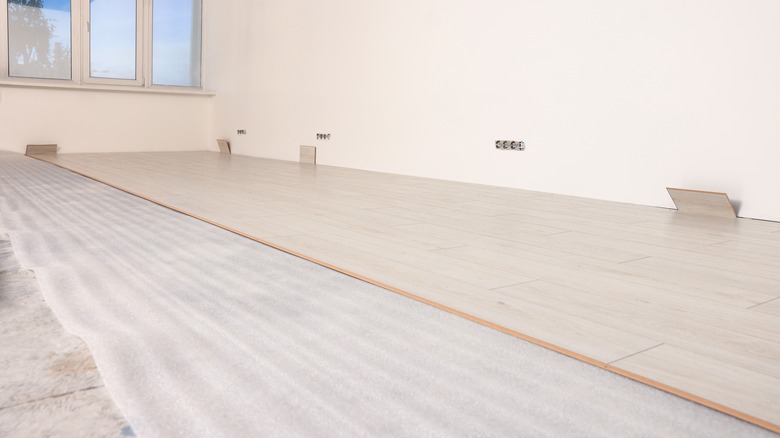Costly Traps To Avoid Falling Into When Re-Doing Your Flooring
When TikTok user Tony Garcia took to the platform to bash the well-known flooring company he works for, people paid attention. An employee at LL Flooring (formerly and soon to be Lumber Liquidators again), he claimed that landlords and homeowners who need relatively minor repairs can't get new boards because vinyl and laminate is updated every few years. This leaves them with little choice other than to install a new floor.
As reported by the Daily Dot, Garcia said the flooring's locking mechanisms are changed periodically even though the material isn't otherwise different, making new stock incompatible with older installations. It remains to be seen whether this revelation is accurate, though commenters on the now-deleted video claimed to have fallen victim to the alleged scheme. Nevertheless, Garcia raised awareness of shady practices in the flooring industry, so we tracked down the traps most commonly derided by industry experts.
Garcia said he encouraged LL Flooring customers to buy an extra box or two of flooring to protect themselves. Most industry traps have even simpler (and cheaper) solutions: Ask for multiple estimates. Check your contractor's reviews, references, license, and insurance. Get everything in writing. Be on the lookout for red flags like ridiculously low bids and incomplete estimates. And finally, look for misleading warranties or ones that exclude items that would normally be covered.
It's important to note that what you take as a scam might just be one of the most common errors that contractors make — they underquote you. Sometimes mistakes are made, and you can't conclude that there's systemic dishonest behavior going on from any isolated blunder. That includes the flooring locking mechanism changes that might be the product of technological advancements.
Mismeasuring and inaccurate estimates
The first sketchy practice some flooring companies and installers occasionally engage in involves a lot of variation on giving the buyer an inaccurate estimate. One of the most common tricks is overstating the amount of materials needed, which is a particular problem in the carpeting industry. The cost of even a small overestimate can balloon quickly if it's based on square footage because you're not just paying for the flooring, but also the pad or underlayment and set up. Just remember that overages — ordering a small percentage of additional flooring products to account for waste during installation — is a completely normal part of the process. If you get suspicious, check that the company has allowed for no more than an extra 15% of materials. To insulate yourself from this trap, get multiple quotes and do your own measuring and calculating to check the contractor's figures.
Sometimes bidders manipulate their numbers in order to help them get the job. One common method is quoting a low per-square-foot (or per-square-yard) price, but then artificially inflating the measurements to make up the loss. This makes the bidder's price look better than competitors, even if there's a slight difference in estimates. Another version involves providing a low quote that either omits or obscures crucial fees and expenses. The additional charges resurface as necessities once the contract has been signed. Your best defense here is to demand and understand a thorough, signed contract that doesn't require you to pay for an installer's miscalculations.
A deal that's too good to be true
A deal that sounds too good might actually be true, but it's probably not the deal you think it is. This flooring trap has a lot in common with the misestimation problem, and you should be on the lookout for both. But the giveaway here is that the price is simply too low. Again, there's a lot of variation here, but the most common scenario is getting a total on a product — or perhaps more often an installation — that vanishes when you examine all the details of the bargain. For example, a company offers a ridiculously low price for flooring a whole house, but neglects to mention additional fees for removing doors, moving furniture, pulling up baseboards, and disposing of old carpet, pad, transition pieces, thresholds.
Sometimes it's not just the fees that are hidden, but the quality. Subpar flooring materials are overhyped, and no one mentions that the company is using unqualified installers to achieve the bargain-basement deals. In one take on the lowest-price scam, companies offer to always underbid competitors — but sell private-labeled products that aren't sold by anyone else, making comparison shopping impossible. In yet another version, bogus discounts are offered. The markdowns are real, but the original price has recently been increased, meaning you're not saving at all.
The incredible disappearing deposit ... and installer
If there's room for honest disagreement about inaccurate estimates and super-low prices, there's not a lot of excuse for this next shady flooring industry practice. Nothing could be simpler than this scam: Require a substantial deposit and, once it's been collected, simply drop off the face of the earth. If your flooring contractor requires a down payment in excess of the industry standard — 10% — you should start vetting them.
Now's the time for verifying any professional licenses and insurance, as well as checking reviews and references. Getting a signed contract in writing is a must, and try to pay with a debit or credit card to improve tracking and fraud protection options. When possible, make deposit checks payable to a third party in a kind of escrow arrangement, and get receipts for everything. Many of these tips are part of the common mistakes everyone makes when hiring contractors.
If your contractor actually begins the work, that doesn't mean all will go well. Require them to update you regularly, and hold your final payment until you're completely satisfied with the quality of the product and work. An honest worker who's simply overextended will understand and honor your withholding of the final payment, while an overaggressive payment schedule is one of the signs that a contractor is taking advantage of you.
The classic bait and switch
Sometimes in a bait and switch situation, your flooring vendor is telling you the truth — at least technically — at every step along the way. Perhaps you were enticed by a "loss leader," a product offered for sale at a price so low the company couldn't possibly make a profit from it. But when you show up to the store, you learn that they're sold out, or the deal is for products of much lower quality than you initially believed. Even a technically honest but not transparent transaction can turn out to be a crime with potentially severe penalties attached. Criminals who are over-concerned about legalities are exceedingly rare, though, and the penalty might not help you much with your flooring problem.
Being a loss leader can be a legitimate strategy for attracting customers. But if you find yourself being talked out of buying the initial product based on its low quality and are, instead, pushed toward a much more expensive flooring option, you're probably in bait-and-switch territory. Remember that the main goal of this particular trap is to get you into the store. The business isn't going to convince every customer to bite on the more expensive flooring, and they know it, so the pressure might not be very intense. In any event, you should always feel free to bail out and consider other options.
The wrong product
A more explicitly fraudulent expansion of the bait and switch method is simply selling you one thing and delivering (and installing) another. Imagine that you've looked at the seller's flooring samples and picked a particular color and finish. One of two devious things could happen at this point: You could sign a contract that charges you for a higher-quality version of the same flooring (thicker, perhaps, or with a better finish). This might be impossible to notice after installation — if you catch the difference at all. Alternatively, you could have the installer show up with a different product than the one you ordered, but probably similar enough that you might not notice. In this case, you might get a thinner material. Or in the case of carpeting, a different face weight or a switch from a better fiber like PET polyester to inferior nylon.
Your best defense is a clear, carefully considered contract that notes any product codes you agreed to from the samples. And, of course, verify that the codes match what is installed. Remember: companies can use private labels to keep you from being able to distinguish what was delivered from what was specified in your contract. Sometimes the lie isn't even about which product, but about its qualities. A seller might falsely represent the material's characteristics — scratch-resistance, for example — and it could be very difficult to understand that you've been scammed. This sort of practice is also made worse by private labeling, which can prevent you from turning to a competitor for information.





